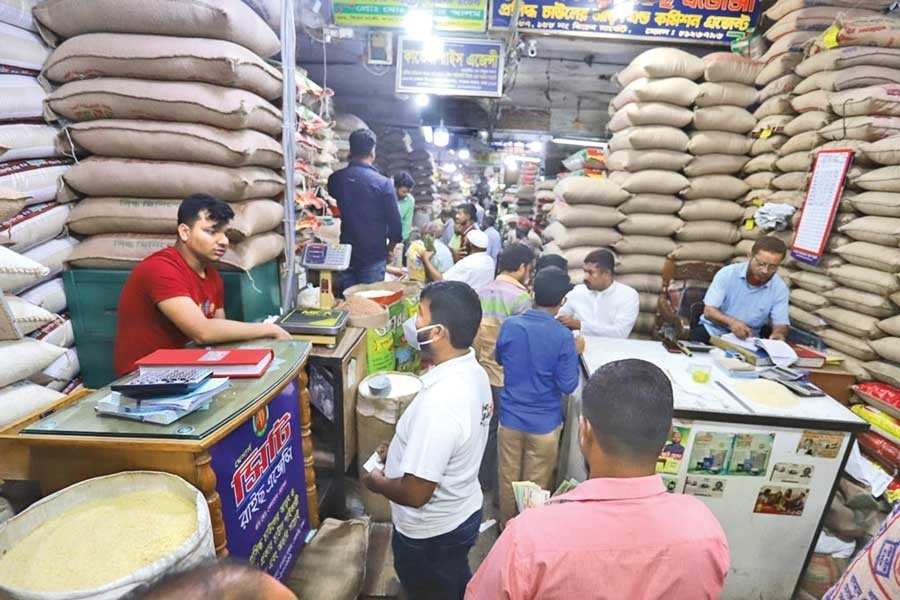The government is falling behind its target in buying 2.1 million tonnes of Boro rice despite an extended deadline.
Millers are refusing to sell rice to the government, breaching their contracts, as the price offered by the government does not match the market price. Under the circumstances, the government cannot reach its target to buy rice. Bangladesh has produced 20 million tonnes of Boro rice this year.
Floods and the coronavirus epidemic harmed the rice mills, pushing them into losses.
The government plans to take necessary action against those who did not comply with the contracts. The government will, however, assess if the millers could not supply rice due to adverse weather.
The Food Planning and Monitoring Committee under the Ministry of Food decided to purchase 1.9 million tonnes of Boro rice this year, setting the prices of Boro paddy at Tk 26 per kg and parboiled and Atap or sundried rice at Tk 36. Later, the government raised the purchase target to 2.1 million tonnes.
The authorities began to buy Boro paddy on April 26 and Boro rice on May 07. The collection, scheduled to finish by August 31, was extended to September 15.
Referring to the Ministry of Food, bdnews24.com reports that the government bought 888,917 tonnes of rice, including 213,067 tonnes of Boro rice, 598,748 tonnes of parboiled rice and 88,604 tonnes of sundried rice as of September 08.
Government warehouses have stored more than 1.41 million tonnes of grains, including 1.14 million tonnes of rice and 269,000 tonnes of wheat.
Some people did not fulfil their commitment to sell paddy and rice to the government, Food Secretary Mosammat Nazmanara Khanum told the news agency.
"Husking mills couldn't buy paddy due to bad weather and an increase in the market price this year. What action can we take against them as their business is already suffering? We have no plan to take action against them but motivate them instead."
The government is taking necessary steps against those automatic rice mills that never sold rice under contract, the food secretary said.
"We have given directives to the finance ministry, deputy commissioners and other government bodies to ensure that those millers who didn't sell rice to the government breaching their contracts, never get the incentive package provided by the government."
The government is listing those who sold rice under contract and those who did not. "In future, we'll provide an incentive for those who supplied the full quantity of rice to the government and deprive those who didn't," Nazmanara said.
Many millers did not sell rice to the government as the market price was higher than the government price. "We need to consider the market situation while applying the contract clauses. We'll identify the defaulters considering the entire situation after the rice collection deadline is over," she said.
"We'll scrutinise why some people could not sell the rice to the government at all; whether they did not have the capacity or there were other factors. There won't be equal measures taken for all. We'll evaluate and decide the form of punishment."
The news agency asked the food secretary if the price fixed by the Food Planning and Monitoring Committee has caused any problem.
"The committee finalises the price based on the production cost of paddy and rice fixed by the Ministry of Agriculture," she said.
"The market price is higher. In an open market economy, traders fix the prices. Rice prices should not shoot up if we take production and demand into account. Traders have illogically hiked the prices, forcing consumers to pay more."
Traders buy rice from millers and then sell it to the wholesale and retail market, the secretary said. The commerce ministry must see why the rice that cost Tk 30 per kg sells for Tk 40 per kg.
"We've written to the commerce ministry asking the authorities to look into the issue. We've seen that production did not decrease, demand did not increase — we fixed the prices accordingly. We're trying our best to enable people to buy rice at the price we fixed. But we can't fix the rice price in an open-market economy. If the market price becomes exorbitant, we supply the rice under OMS or other programmes to control it."
They are yet to have the full information on the quantity of grains stored by all the farmers, traders and millers in the country, said Nazmanara.
"Those who cannot bear a financial loss didn't sell rice to the government. This time they can't sell rice to the government even if it puts them in jail," said Layek Ali, general secretary of Bangladesh Auto Major and Husking Mill Owners Association.
"Why would the millers sell rice to the government at Tk 36 per kg when the same rice is sold at Tk 41-42 in the market amid the coronavirus pandemic?"
Many of the millers will have to sell out their mills if they want to supply rice at the government rate, said Ali. "Many mills are struggling for their existence during the pandemic and floods. We don't know what is going to happen."
The millers appealed to the food ministry several times to increase the rice prices, which was never considered, an official of the ministry said, asking not to be named. So, the millers did not sell their rice to the government anymore, he said.
Besides the millers, people have a large quantity of food grains stored with them, though the exact amount is not known, said Sarwar Mahmud, director-general of the Food Directorate.
"It's hard to assume what quantity of grains people are storing. As there has been a bumper harvest this year, the grains must be stored somewhere."


